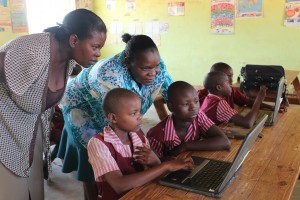 The school has scored a first in the country – bridging the gap between rural dwellers and their urban counterparts. “This is a great achievement as we have managed to teach students in rural schools to operate computers. We started as a small school with an enrolment of less than 150 students in computer studies. But this number has now doubled and we expect that it will continue to increase,†said computer teacher Qelani Jiho
The school has scored a first in the country – bridging the gap between rural dwellers and their urban counterparts. “This is a great achievement as we have managed to teach students in rural schools to operate computers. We started as a small school with an enrolment of less than 150 students in computer studies. But this number has now doubled and we expect that it will continue to increase,†said computer teacher Qelani Jiho
“The great thing is that the computer lab can be used on a daily basis as it is a solar-powered system. There is no problem of power cuts because sunlight is always there,†she said.
“Our staff members have undertaken computer lessons and everyone is now able to use computers. We are now able to print our own examination papers, something which we never dreamt of before. This is ideal for a rural school because our staff members and students are now part of the global technological society,†added an elated Jiho.
The acting director of UNESCO’s Associated Schools Project Network (ASPnet), which is running under the Ministry of Primary and Secondary Education, said there was need to install similar solar labs throughout the country. “This is vital if marginalised communities are to embrace ICT,†he said.
The UNESCO co-ordinator, Innocent Chademana, said the project had the potential to transform lives in rural areas and urged the government to embrace renewable sources of energy. “Government has donated computers to various schools around the country, but what boggles the mind is that these computers are lying idle because of lack of electricity,†he said. “We urge the corporate world to come on board and fund the establishment of this solar-powered system that is cost effective,†he said.
The school, which opened its doors in 2000, was meant to cater for newly resettled farmers’ children who were walking long distances of more than 10km to attend school. The idea of setting up a solar-powered computer laboratory is to bridge the gap between rural dwellers and their urban counterparts.
When The Zimbabwean visited the school last week it was business as usual with computer studies students winding up their projects ahead of the November examinations.
Post published in: Featured


World embalming powder for retail and sale in south Africa, Johannesburg +27603051423
What is embalming powder?
Embalming is the art and science of preserving human remains
by treating them in its modern form with high modern and scientifically generated chemicals to forestall decomposition for future use and other purposes.
Preservation is usually done by the high personalities when they die and mostly was done by the ancient king in different monarchies.
Uses.
The intention is to keep them suitable for public display at a funeral, for religious reasons, or for medical and scientific purposes such as their use as anatomical specimens and science purposes.
Embalming preserves the human body intact, whereas taxidermy is the recreation of an animal’s form often using only the creature’s skin mounted on an anatomical form.
Embalming preserves the human body intact, whereas taxidermy is the recreation of an animal’s form often using only the creature’s skin mounted on an anatomical form.
Preparing the Body
Make sure the body is face up.
Remove any clothing that the person is wearing.
Disinfect the mouth, eyes, nose, and other orifices.
Shave the body.
Break the rigor mortise by massaging the body.
Types of body embalming powder .
HAGER WERKEN-Germany
NORMAL EMBALMING POWDER-India
Differences between the two products is in terms of reaction and the percentage of uranium contained.
Germany type 0.007 % uranium and fast reaction.
India 0.005 % uranium slow reaction.
For supplies contact +27603051423 or email: infoephedrine@gmail.com